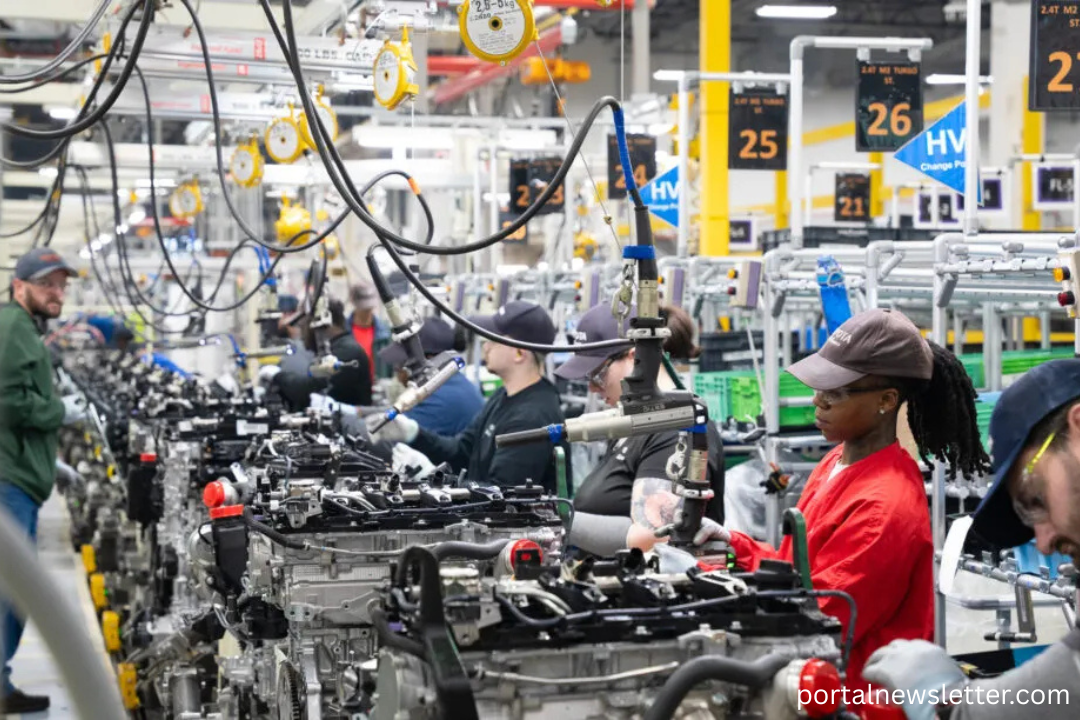The business world is abuzz with speculation that Toyota Motor Corporation might be planning a buyout of its subsidiary, Toyota Industries. If confirmed, this move could significantly impact both companies and have far-reaching effects on the broader automotive and industrial sectors. As Toyota Industries shares soar on the news of this potential buyout, investors and analysts are closely watching how this will unfold and what it means for the future of both companies.
Understanding Toyota Industries and Its Role in the Market
Toyota Industries, a key player in the global industrial sector, has long been a subsidiary of the much larger Toyota Motor Corporation. Known for its diverse operations, Toyota Industries manufactures a wide range of products, including automotive parts, industrial machinery, and logistics equipment. The company plays a critical role in Toyota’s supply chain, providing essential components for the automotive giant.
Apart from its involvement in the automotive sector, Toyota Industries has also ventured into other industries, such as air conditioning, electronics, and materials handling. This diversified portfolio makes it a significant player in multiple markets, and any changes to its ownership structure are bound to attract considerable attention.
The Toyota Buyout Rumors – What We Know So Far
Recent reports suggest that Toyota Motor Corporation is considering acquiring the remaining shares of Toyota Industries. Currently, Toyota Motor holds a significant stake in Toyota Industries, but a full buyout would allow it to integrate the company more closely into its operations.
The rumors of a potential buyout have led to an uptick in Toyota Industries’ stock price, as investors anticipate the company’s value rising in the wake of such a move. If the buyout proceeds, Toyota Motor’s supply chain will likely be strengthened, and its ability to respond to global market demands, especially in the ever-evolving automotive sector, will improve.
The Strategic Benefits of a Toyota Buyout
A buyout of Toyota Industries by Toyota Motor would offer several key strategic benefits for the parent company. First, it would enable Toyota Motor to exert greater control over its supply chain. Toyota Industries has been instrumental in providing high-quality components, and by acquiring them, Toyota Motor Company can ensure a more efficient, streamlined production process.
Additionally, Toyota Industries is heavily involved in the manufacturing of industrial machinery, including material handling equipment. By bringing these operations fully under the Toyota Motor umbrella, the company could benefit from increased innovation and potentially new product lines.
The buyout could also be an opportunity for Toyota Motor to diversify further into sectors outside of the automotive industry. Toyota Industries’ involvement in areas like electronics and air conditioning could provide new avenues for growth, especially as Toyota continues to push toward more sustainable, eco-friendly technologies.
Financial Implications of the Potential Buyout
The financial implications of a buyout are significant. A complete acquisition of Toyota Industries would likely require a substantial investment from Toyota Motor. While the exact price tag remains unclear, analysts predict that the buyout could be worth billions of dollars. Toyota Motor has the financial resources to handle such a transaction, but it would likely involve complex negotiations regarding the valuation of Toyota Industries.
Once the buyout is completed, Toyota Motor could realize increased efficiencies within its supply chain. The integration of Toyota Industries would enable Toyota Motor to better control costs and enhance product development timelines. However, the financial benefits of this acquisition may take some time to materialize as both companies work through the transition process.
Toyota Industries’ Stock Performance and Market Reactions
The news of a potential buyout has had an immediate effect on Toyota Industries’ stock performance. Shares have surged in recent days, reflecting investor optimism about the potential deal. This uptick in stock price is a clear indication that the market views the buyout positively, with expectations that Toyota Industries’ valuation will rise as a result of the acquisition.
On the flip side, analysts are also carefully monitoring Toyota Motor’s stock, as any disruptions during the buyout process could temporarily affect its market performance. However, in the long term, investors believe that the integration of Toyota Industries would ultimately strengthen Toyota Motor’s position in the global automotive market.
Toyota’s Vision for the Future and the Role of Toyota Industries
Toyota has long been at the forefront of automotive innovation. With its focus on hybrid and electric vehicles, autonomous driving technologies, and environmental sustainability, Toyota Motor has been adapting to the rapidly changing automotive landscape. The potential buyout of Toyota Industries could align with Toyota’s broader vision for the future, providing the company with the resources needed to expand its capabilities and stay ahead of competitors.
By fully integrating Toyota Industries, Toyota Motor could streamline its operations and better position itself to meet the growing demand for eco-friendly technologies. Toyota Industries’ expertise in industrial machinery and material handling could complement Toyota Motor’s push to become a leader in sustainable manufacturing practices.
Additionally, the buyout could help Toyota further diversify its offerings, particularly in non-automotive sectors, allowing the company to explore new avenues for growth. By consolidating these operations, Toyota could also leverage its brand strength to push innovative solutions in other industries, such as robotics, electronics, and energy-efficient technologies.
Challenges of Integrating Toyota Industries

While the buyout of Toyota Industries offers numerous benefits, it is not without its challenges. One potential hurdle is the integration process itself. Merging the operations of two large companies can be complex and time-consuming. There are often cultural differences between organizations, and aligning business practices, methods, and objectives can be difficult.
Additionally, the transition could face regulatory hurdles. The deal would need to be approved by the appropriate regulatory bodies, and there may be concerns about monopolistic practices or anti-competitive behavior. These concerns could delay the buyout and potentially affect the value of both Toyota Industries and Toyota Motor’s shares in the short term.
What Does This Mean for Investors?
For investors, Toyota Industries’ potential buyout presents an interesting opportunity. As Toyota Industries’ stock price has risen in anticipation of the buyout, investors who have held shares in the company may see a considerable return on their investments. However, it is essential to recognize that the stock market can be volatile, and the outcome of the buyout process is still uncertain.
For investors in Toyota Motor, the buyout may be seen as a long-term growth strategy, but it could also introduce short-term volatility as the company absorbs Toyota Industries. Regardless of the potential short-term fluctuations, many analysts believe that the integration of Toyota Industries could strengthen Toyota Motor’s long-term financial outlook.
Frequently Asked Questions (FAQ’s)
What is the potential buyout of Toyota Industries by Toyota Motor?
The potential buyout involves Toyota Motor Corporation acquiring the remaining shares of Toyota Industries, bringing the subsidiary fully under its control to enhance integration and streamline operations.
How would the Toyota buyout benefit Toyota Motor?
The buyout would strengthen Toyota Motor’s supply chain, offer greater control over production processes, and help the company explore new growth avenues outside of automotive manufacturing, such as robotics and sustainable technologies.
What industries do Toyota Industries operate in?
Toyota Industries manufactures a diverse range of products, including automotive components, industrial machinery, air conditioning systems, and material handling equipment.
Why is Toyota Industries’ stock rising amid the buyout rumors?
The rumors of a buyout have led to increased investor optimism, which has raised Toyota Industries’ stock price. Investors expect the buyout to enhance the company’s value, leading to higher returns.
What challenges could arise from the Toyota Industries buyout?
Integration challenges may arise, including aligning business practices and overcoming regulatory hurdles. Merging two large companies could also involve cultural and operational differences, which might complicate the process.
How does this potential buyout affect Toyota Motor’s market position?
The buyout could bolster Toyota Motor’s market position by improving operational efficiencies, fostering innovation, and ensuring a more sustainable and integrated production process, especially in the areas of hybrid and electric vehicles.
When is the Toyota Industries buyout expected to happen?
The exact timeline for the buyout is unclear. While negotiations are ongoing, the process could take months to finalize, depending on regulatory approvals and the complexity of the integration.
How will the Toyota Industries buyout impact global markets?
The buyout could strengthen Toyota’s global competitiveness, potentially increasing its market share and enhancing its ability to respond to global automotive and industrial demands. This move might also influence investor sentiment and market trends.
Conclusion
The potential buyout of Toyota Industries marks a significant moment in Toyota Motor’s evolution. With this move, Toyota can further solidify its global leadership in the automotive and industrial sectors. Although challenges exist in terms of integration and financial considerations, the strategic benefits of consolidating Toyota Industries into Toyota Motor are clear.
For now, Toyota Industries’ stock is benefiting from the optimism surrounding the deal, and Toyota Motor’s broader vision for the future will likely gain momentum as it leverages Toyota Industries’ expertise. As both companies navigate the complexities of the potential buyout, Toyota’s future looks promising, with a more streamlined, innovative, and sustainable operation on the horizon.


